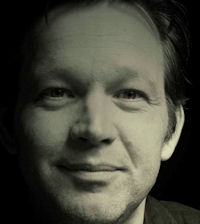 |
STAGES PER STUDENTI DI SCUOLA SECONDARIA STAGES INVERNALI 2009 |
 |
 |
STANISLAUS BENTVELSEN
|
I hope you mean workwise! I am working at Nikhef, the Dutch National institute for High Energy Physics. We are doing various projects and I am currently the program leader of the ATLAS detector at the LHC collider. This means that I coordinate the Dutch efforts in ATLAS, which includes hardware responsibilities and analysis plans. We have something like 24 PhD students in the group, 5 postdocs and 17 staff. It's a lot of administrative work! Besides, I am professor at the University of Amsterdam - and am teaching two main courses: one on Special Relativity for 1st years students, and another on particle physics for 3rd years students. Privately: I am married and have two children - a daughter of 12 years old and a son of 8. I play a little bit piano, and like to watch movies and read a book. Q: How and why did you decide to study physics and which is the best memory of your life as a student? I think I wanted to study physics already when I was at High School when I got a little book about quantum mechanics and also on relativity. I then decided to study physics. I must say that also two of my physics teachers at High School were very important - they made me enthusiastic about it. I enjoyed my study very much, although I did have many friends outside physics as well. The best memories were the excellent lectures, and then in the evening in the cafeteria to tell my friends about it. During my PhD I really enjoyed meeting people from various places. The best memory as student was a fantastic school on physics with people from all over Europe, in the Crimea, close to Yalta. :-) Q: Which difficulties did you have to face and what was the most exciting episode of your career? Right now we have a very difficult period. The LHC accelerator is delayed by more than one year, and a number of PhD students are simply waiting to get collisions to analyze. They are frustrated - like me! - that it takes so long. The most exciting periods were two: first the startup of the HERA collider when I was working for the ZEUS collaboration. That was a time when everything as new to me and we were extremely eager to analyze the data. This time at the startup of ZEUS was very impressive. Q: What are you working at presently? I am doing a lot of administration tasks at the moment. But when I have some time I am particularly interested in top-quarks. They will be produced in large numbers at the LHC - and leave the most complex signatures in the ATLAS detector. I think that these top-quarks are important for the following reason: if we understand how they look like in ATLAS, we basically understand everything of the behavior of the detector. Then we are ready to search for new particles. Q: Which do you believe will be the next discovery in physics? I really hope we will find a new elementary particle in physics. I will be very happy if we will find the Higgs particle - but I will be completely excited if we find completely new, unexpected particles! Q: In your opinion, which is the best discovery ever and who is your favorite scientist? Ouch, what a difficult question. Maybe the best discovery is that of the nucleus, around 1911 by Rutherford. Or the discovery of quarks around 1970. Or the Z and W bosons in 1983. I cannot choose. Rutherford is one of my favorite scientists - as well as Feynman. Q: How important is the collaboration in scientific research, especially among researchers from different countries? This is crucial! CERN offers a very nice environment where this can happen - and I think that everybody that studies physics should pay a visit to that laboratory. ATLAS has something like 1800 authors coming from 60-something countries. So its absolutely essential that you collaborate with people from all over the world. I enjoy this aspect of physics very much. Q: How can a scientist be defined and how do talent, intuition and study influence his profession? Also difficult! I think curiosity should be the main driving force for a scientist. And persistency. You have to stick to a problem for a long time and try to fully understand all aspects of it. When I was stuck with a problem a solution could occur to me under the shower or on my bicycle. But you also need a bit of luck. Q: What are your hobbies and passions and what book would you suggest us to read? I enjoy music very much, mostly classical but also jazz style. Currently I like Schubert very much - but very broadly between Bach and Shostakovich. Also people like Silje Niergaard, Miles Davies, etc. I enjoy people that concentrate fully on something. Currently I am reading Bryson "A short history of nearly everything". Maybe that you should read as well! Q: How do you see the future of research in this period of global economic crisis? Well, I think science has brought us further in the past. Scientific discoveries are the driving force of society. Maybe this crisis will make people realize even better that science is needed - and that it needs to be supported at all costs. |